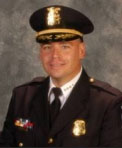The top three reasons police officers should use LinkedIn are pretty much the same as the top three reasons anybody should use LinkedIn.
![]()
They are:
1. Participating in LinkedIn groups
2. Leveraging the LinkedIn extended network to solve police business problems
3. Career development
The disconnect is that many cops aren’t necessarily business minded and they may not be forward-thinking about their own careers as might be beneficial to them. But the times, they are a changin’ and so too should the way police officers think of their own careers, the running of their agencies and the way they connect with other like-minded people.
Chief David Molloy heads the Police Department of Novi, Michigan. He joined LinkedIn about 8 months ago and already has connected with 450 other professionals, both within law enforcement and not. Molloy masterfully leverages the online tool in all three of the ways mentioned above.Others can see my organization is on the cutting edge. My contacts are CFO’s and COO’s who comment that the police agency is not afraid to take risks and we’re willing to share what we’re doing. We’re not cloak and dagger as law enforcement is known for. ~ Chief David Molloy, Novi, MI
Molloy uses LinkedIn to connect with leaders both locally and outside of his community. He also communicates regularly with colleagues around the country who are members of the International Association of Chiefs of Police (IACP) and the Federal Bureau of Investigation National Academy Associates (FBINAA) through groups on LinkedIn.
Novi’s top cop maintains his reading list on LinkedIn and regulary gets comments on the books he’s reading. Additionally, he says he welcomes the transparency LinkedIn offers, adding, “Others can see my organization is on the cutting edge. My contacts are CFO’s and COO’s who comment that the police agency is not afraid to take risks and we’re willing to share what we’re doing. We’re not cloak and dagger as law enforcement is known for.”
Police officers can otherwise connect with other cops who share the same interests or who might be tackling the same types of issues that they are. One of the best ways to do this is to join a group. The Law Enforcement 2.0 Group for example was started just a few weeks ago by Mike Waraich at Daily Splice and addresses issues regarding law enforcement’s use and adoption of social media. It’s fairly active, if only because we social media bloggers are chiming in a lot, and it already has about 75 members. Topics that groups address are seemingly endless but if something isn’t addressed by a group, anybody can start one. Molloy plans to start a group for Michigan Police Chiefs.
Sign up, search for some friends and colleagues and join some groups. Go get the first 20 or so contacts by initiating a request and asking people to connect; it gets easier and faster after that. It takes about 75 connections and some time on a Saturday afternoon to fully realize the potential of LinkedIn. Explore the “statistics” to see your extended network. Once you see how many people and places are in your extended network, imagine the possibilities if you’d like to relocate or take your LE career in a new direction. And don’t worry, you can fully manage settings to prevent people who aren’t connected with you from seeing certain aspects of your profile, even your name and photo.
The basic LinkedIn account is free. In fact the only thing I don’t like about LinkedIn is that to upgrade to the next level costs $25 per month. I think that’s a bit steep but there’ll come a day when I might bite the bullet and do it anyway. So sign up, join Law Enforcement 2.0, and tell them “Lauri sent you”.


